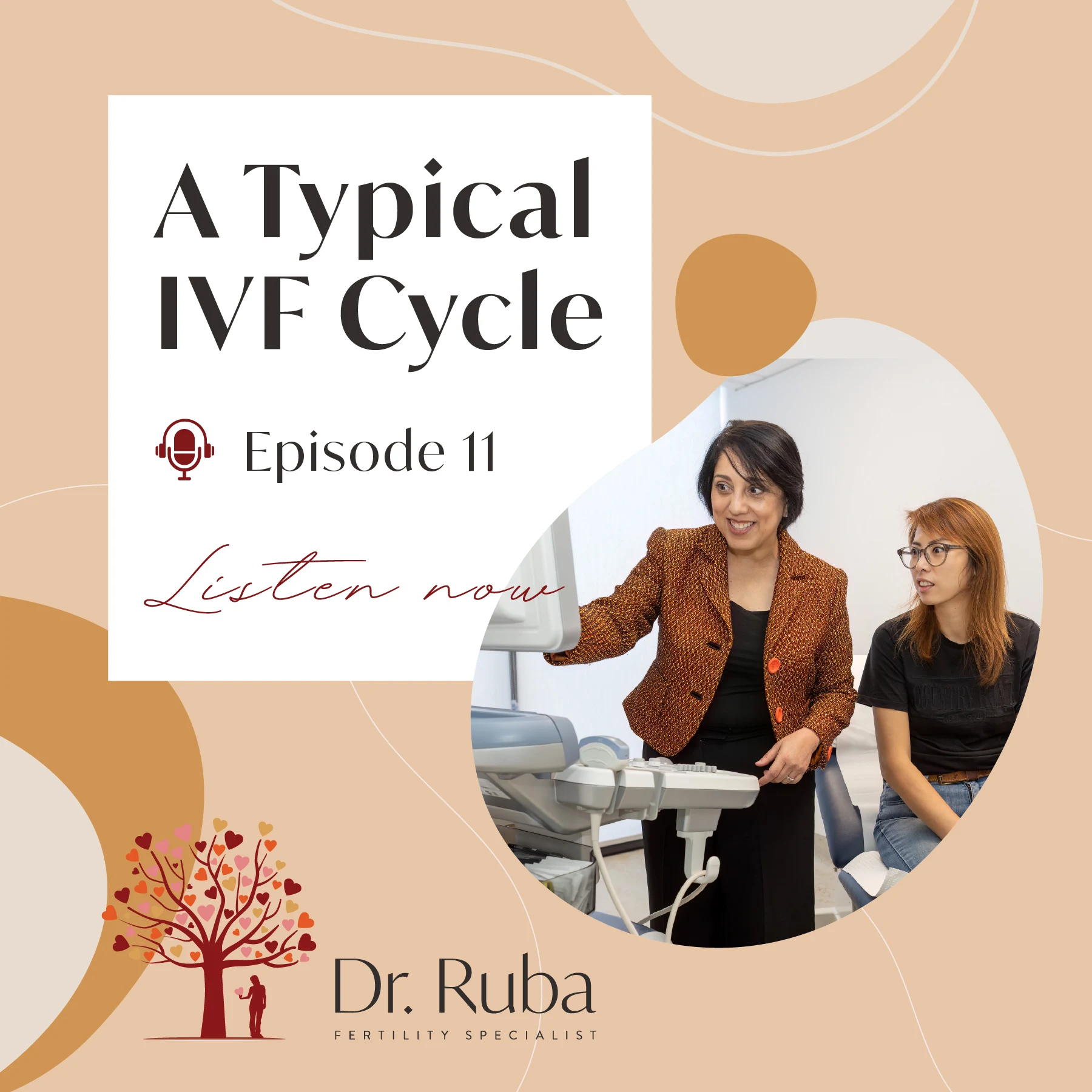
Available on Your Favourite Podcast Platform
Episode 11: A Typical IVF Cycle
What does one typical IVF or ICSI cycle look like? How long does it take, and what are the different stages? How many appointments will you have, and how many days will you need to take off work? This episode runs through a typical cycle of a fertility treatment, from the first day to the last.
One Cycle: From Day 1 to Pregnancy Test
When you are new to fertility treatment, the terminology and scientific process involved in IVF or similar treatments can be a bit overwhelming. It’s not uncommon to feel like you need to listen to the information at least twice! Which is why we thought it would be great to record this podcast about what’s involved in a typical IVF or ICSI cycle, as well as write a condensed version here. For the full details, please listen to the full episode.
An IVF cycle typically begins on the first day of a woman’s period, and you begin taking follicle stimulating hormones (FSH) via an injection on day 2. You will be taught to do these injections at home and you’ll barely feel a thing, so don’t worry!
These FSH injections have the role of growing as many eggs as is safely possibly inside the ovaries. Each egg grows inside a follicle, which is a little sac. During this first stage, you will have at least one ultrasound so that your fertility specialist can count the number of follicles and see how they are growing. You will also start an injection to stop you ovulating too early.
After approximately 10-12 days, you will be given a ‘trigger injection’ which helps to mature the eggs. Around 36 hours later, you will go to the fertility clinic for ‘egg pickup’, where you will be put under light sedation while they use a needle to retrieve the eggs from each follicle sac. This minor procedure only takes 10-20 minutes, and most women require only 1-2 days off work.
The next stage is to count the eggs and assess their maturity before introducing the sperm to create an embryo —or alternatively, freezing the eggs at this stage for future use. A male partner will have ideally given a sperm sample that same day, but frozen sperm can also be used.
The next day, we will know how many of the embryos have fertilised, and then our embryologists will track their growth over the next 5 days. It is important to realise that there is significant loss in this stage and not all embryos will grow to a size acceptable for transfer. From a batch of about ten eggs, if all of them fertilised, it is realistic to hope for three good quality embryos at the end of that process.
Our embryologists will then grade the embryos and recommend which embryo should be selected for transfer, and if we are able to freeze any others. The transfer itself is quick and easy —no sedation required. You’ll also start taking progesterone to help prepare the uterine lining and support implantation.
And then…you wait. 10 (very long) days later, you’ll come back to our clinic for a pregnancy test. We strongly recommend you don’t use a home test before then as the hormones we use for IVF can replicate pregnancy symptoms so can give you a heartbreaking false positive result.
Once you have a positive pregnancy, we monitor your pregnancy hormone level until we reach a good level, and then we can do an ultrasound to see how the pregnancy is going. Some fertility specialists like myself are also obstetricians so we can continue your pregnancy care right through to birth. It’s a huge privilege to be part of that journey.
It’s inevitable that after the fertilisation process happens on day one that usually not all embryos will continue to grow up to day five. So from a batch of about ten eggs, if all of them fertilised, we’d expect hopefully to have three good quality embryos at the end of that process.
We look forward to supporting you.
If you have any questions or would like to book a consultation, please contact us via any of the methods below. You can also submit a question for Dr Ruba to address on her fertility podcast, Fertile Ground.
Practice Hours
Monday-Thursday: 8:30 – 5:00pm
Dr Jyotica Ruba
Fertility Specialist, Obstetrician & Gynaecologist
BM, FRANZCOG, MRMed
Suite 2.5, Level 2,
Deakin Health Hub,
63 Denison St
Deakin ACT 2600
"*" indicates required fields
